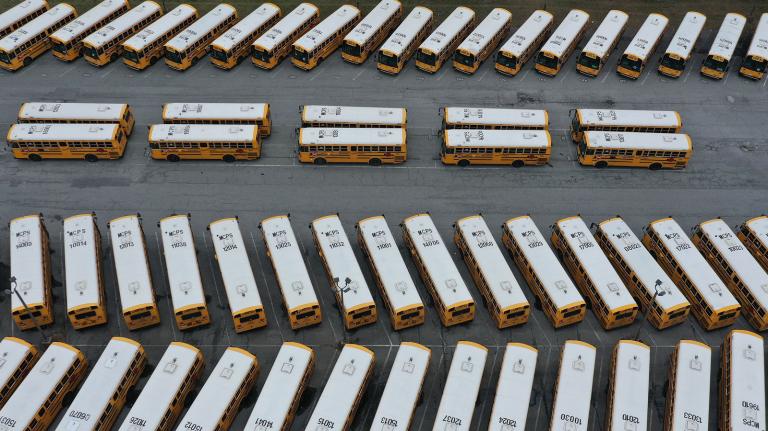Yifat Susskind is the executive director of MADRE, an international feminist fund and women’s human rights organization.
“No nation can find lasting security without addressing the climate crisis,” Defense Secretary Lloyd Austin pronounced at the Earth Day Leaders’ Summit in April, adding that intelligence agencies are analyzing the security implications of this existential threat as directed by President Biden. Such assessments typically include dangers like weather events damaging military bases or armed conflicts arising over scarce natural resources.
For those of us who grasp the need for urgent climate policy action, this may seem like a reason for hope. After all, the more people in power who take the mounting risks seriously, the greater the opportunity to press policymakers for real progress.
But legitimizing militarized responses to the crisis will only make the situation worse.
To be sure, climate breakdown threatens people’s safety. Drought has triggered warfare from Syria to South Sudan. Twin hurricanes that slammed Central America have forced thousands of people to migrate from decimated communities. Ice storms in Texas crippled the grid and left people freezing. Wherever climate catastrophe strikes, our interconnected world is less secure. What to do about it, though, depends upon your definition of security.
Since 9/11, national security has been a military matter of protecting “us” from “them” using violence and control: fortifying borders, capturing “terrorists,” or waging wars in places like Iraq and Afghanistan. But beyond the abuses embedded in this strategy, this approach will fail against climate change.
In this militarized way of thinking, the danger lies not in crop failures but in the uprooted migrants seeking safety at our borders. The threat is not the drought, but the armed groups controlling water supplies. This definition of national security divides us and diverts attention from addressing a global crisis that will require us to work together as allies, not enemies, to solve.
The problem with making climate change a military problem is that it presupposes a military solution, giving cover to bloated defense and national security budgets. That’s exactly what we’re seeing — and the last thing we need. The Biden administration requested $753 billion for defense spending this year — a $12.3 billion increase over the previous year. Some of this excess is couched in rationales about money for climate change mitigation, the resilience of defense facilities, and research and development to improve “energy performance and optimize military capability.”
The Biden administration has suggested greening the military, but even then the Department of Defense will remain an outsized polluter. With 800 foreign bases, the U.S. military is the world’s largest institutional consumer of oil. Moreover, one of the military’s key functions is ensuring ongoing access to oil, something we spend about $81 billion a year doing. The U.S. uses the military to pledge allegiance to fossil fuels and exacerbates the root causes of the climate crisis.
From arms sales to training foreign militaries, U.S. military policy fundamentally undermines communities’ ability to address the climate crisis. For instance, to adapt their livelihoods to worsening drought, communities in Yemen will need to create sustainable ways to harvest and store water — a goal made nearly impossible when they’ve been decimated by American-made bombs.
National security has also been used as a rationale to repress the women and Black, brown, and Indigenous people who are tackling the fracking, oil pipelines, and logging projects that endanger their communities and the planet. The Department of Homeland Security has classified non-violent demonstrators targeting the oil industry as “extremists” and stated that “racially and environmentally themed ideologies” were among the key drivers of domestic terrorism between 2014 and 2017.
[A pipeline is threatening their homeland. Indigenous women are fighting back.]
Before we can name climate breakdown as a security threat, we must reclaim and redefine security in a way that centers cooperation and human rights. That’s where feminist foreign policy comes in.
My organization was founded in 1983 to expose and confront the abuses of the Reagan administration, which trained and funded militias that brutalized communities in Central America — all in the name of so-called “national security” under the Cold War. For decades, we’ve called for a feminist foreign policy that ensures the fundamental aspects of human security: housing, health care, a living wage, and a world free of environmental destruction and violence. In short, feminist foreign policy orients security as fundamentally about care.
As Honduran environmental activist and Indigenous leader Berta Caceres, when accepting a Goldman Prize for her tireless work, said, “Mother Earth — militarized, fenced-in, poisoned, a place where basic rights are systematically violated — demands that we take action. We must build a society that is capable of co-existing in a just manner, in a dignified manner, and in a way that protects life.” Caceres was killed in 2016 after years of death threats.
To address the climate crisis without causing more harm we must support efforts by progressive groups and lawmakers who are pushing to cut the Pentagon budget and reallocate those funds toward bold solutions that focus on caregiving, green jobs, and helping frontline communities to adapt and thrive at home and around the world — a switch that the majority of Americans support.
Care work — largely performed by women and girls of color — is the critical low-carbon work that sustains our entire global economy, yet is too often underpaid and unrecognized. In a landmark advance, Biden’s infrastructure plan included care work — an unprecedented recognition that feminist foreign policy can build upon.
A feminist foreign policy also prioritizes accountability for harm, which means that the U.S. must contribute its fair share of climate funding as the world’s largest historical carbon emitter. This money should resource local, feminist approaches to climate mitigation and adaptation. In Colombia, for example, that means pivoting away from failed policies like military aid and fighting the ‘drug war’ and instead funding things like grassroots Afro-descendant women who are organizing to protect their territories and communities from extractive industries, even under death threats.
Not long ago, I asked a simple question to a group of young, rural Indigenous and Afro-Colombian women taking part in a community-building project in the western region of Choco: “What would security look like to you?” The answer of one young woman stuck with me: “Security for us means breathing well, feeling well, and feeling free from violence. It means a society that cares for the safety and well-being of land, women, and girls. It means no more war. Armies don’t create those conditions. They only put them further out of reach.”
The views expressed here reflect those of the author. Fix is committed to publishing a diversity of voices. Got a bold idea or fresh news analysis? Submit your op-ed draft, along with a note about who you are, to fix@grist.org.




